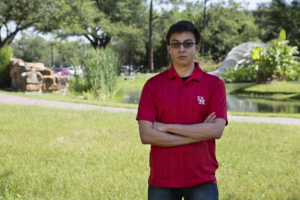The National Science Foundation (NSF) was created by the U.S. Congress in 1950 to promote the progress of science and its applications in national functions like healthcare and defense. In the 64 years since its inception, NSF has emerged as one of the country’s most prestigious and esteemed scientific foundations, awarding the nation’s most respected researchers with grants and fellowships for outstanding strides in science, technology, engineering and math.
One of the NSF’s highly sought-after fellowships is the NSF Graduate Research Fellowship Program (GRFP). According to NSF, the program “helps ensure the vitality of the human resource base of science and engineering in the United States and reinforces its diversity.” It is the oldest graduate fellowship of its kind, and selected fellows receive an annual stipend for three years along with a tuition allowance and research and professional development opportunities.
The fellowship is open to graduate students in any of the STEM fields. As part of the application process, students must illustrate academic interest in terms of grades as well as research in addition to community outreach efforts and technical skills. The fellowship has always been extremely competitive, and recent federal government funding cuts to NSF have further narrowed the margin of selected applicants.
This is why it’s no small feat that the Cullen College’s own Christopher Ortega (BSME ’12), a Ph.D. student studying mechanical engineering, was awarded an Honorable Mention for his GRFP application. It’s not a full fellowship, but Ortega said he wasn’t disappointed. “…I know I might be weak compared to some of the [other]students [who applied], but I feel good that I was able to get on par with them,” he said. “It is very competitive because of government cuts, and there are more graduate students every year. So we have a smaller pie and more students.”
Along with the notoriety (the NSF Honorable Mention list is even published with the U.S. Congress), the honorable mention recipients are provided enhanced access to cyberinfrastructure resources, including supercomputing time, in support of research toward completion of the graduate program of study. But for Ortega, his graduate pursuits aren’t motivated by reputation or perks.
“It’s purely wanting to continue my education and further enhance human knowledge,” he said.
Ortega was referred to mechanical engineering associate professor Li Sun. “Dr. Sun gave me my first shot [as a research assistant], and I’ve been with him now for five years.” Sun now serves as Ortega’s Ph.D. advisor, and under his direction, Ortega researches effective uses of nanotechnology in the biomedical field. “There is a lot of complex machinery out there that can make very complex nanostructures, but it’s going to take a year to make a gram’s worth [of material], which makes it kind of useless in terms of helping the average person. A lot of our research is figuring out how we can make these nanostructures that have these really great properties, but make it in bulk. Make a gram a week instead of a gram a year.”
Nanotechnology – and materials science as a whole – remain Ortega’s true love. “I characterize the world as being defined by materials. In the Stone Age, we had stone tools. Then we had bronze tools, then we got into metallurgy and mixing metals together to get steel. From steel, we went to rubbers, to silicon and semiconductors. Now we’re at the stage where nanotechnology is opening up the world for material scientists,” he said. “You hear scientists talking about things like a space elevator, or nanobots that can go in your body and clean out all the pathogens, and the limitations are the materials. They can’t build it unless they get a stronger material. They can’t do it unless they can figure out how to make this structure smaller or with certain properties. It’s all materials science. You can’t build these things unless you have the building blocks, and the materials are the building blocks.”
While Ortega finishes his Ph.D. over the next several years, he said he plans on researching new fellowship opportunities and mapping out a career plan that he hopes will land him in one of the National Labs run by the U.S. Department of Energy.
